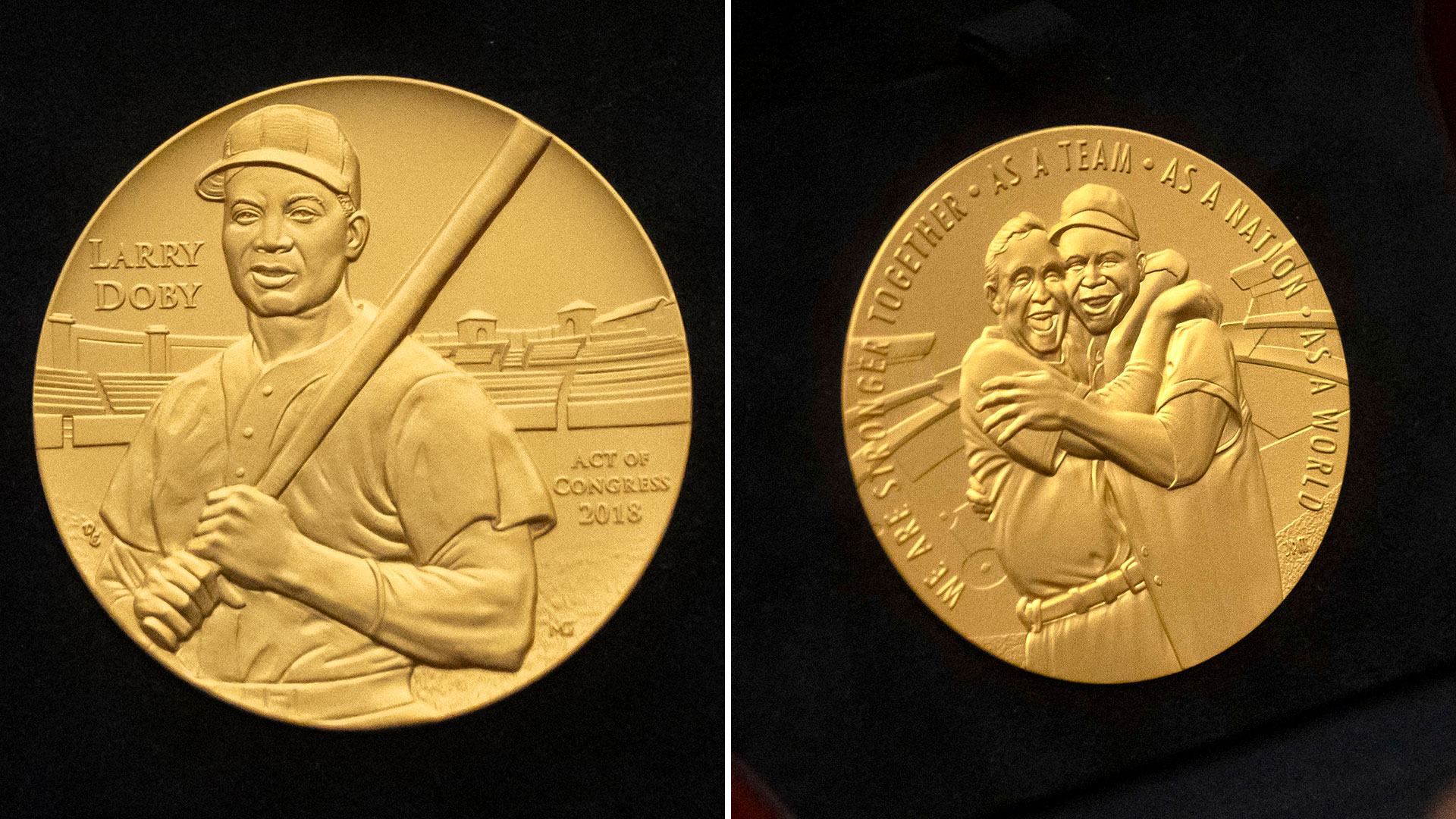WASHINGTON -- On what would have been his 100th birthday, Larry Doby finally got his due.
Doby, the oft-overlooked baseball pioneer who integrated the American League with the 1947 Cleveland Indians and served his country during World War II, was posthumously honored with the Congressional Gold Medal in a ceremony Wednesday at the National Statuary Hall at the U.S. Capitol. His son, Larry Doby Jr., who accepted the newly minted gold coin on his behalf, described the experience as “overwhelming.”
“This means the world to my family,” Doby Jr. told the assembled crowd of family, friends and politicians. “He’s normally recognized only for what he did on the field, but this kind of says he was a pretty good guy off the field. He helped advance his country, and he would be extremely proud and humbled by this honor.”
Commissioner Rob Manfred released a statement celebrating the ceremony, calling it a “proud day” for MLB.
“Larry Doby will forever be remembered as a pioneer who demonstrated great character and courage throughout his life,” Manfred said. “His legacy as a trailblazing player and manager endures to this day, and he will always remain one of the great heroes that our national pastime and nation have ever known.”
In Cleveland, where Doby played 10 of his 13 American League seasons and twice led the league in home runs, the Guardians will celebrate the ceremony this week with billboards depicting the image of the gold coin.
Doby, who passed away in 2003, had to wait 39 years after his playing career ended before he was rightly inducted into the National Baseball Hall of Fame in 1998. And his family members, including Doby Jr. and his sisters Christina, Leslie, Kim and Susan, had to wait quite a while for the official presentation of the country’s highest civilian honor.
Rep. Bill Pascrell (D-NJ), who hails from Paterson, N.J., where Doby attended high school, first sponsored a bill to award Doby the medal in 2016. The bill passed in December 2018, and various issues related to the COVID-19 pandemic and the design of the coin delayed the ceremony.
But this centennial celebration was a fine and fitting tribute to a man described by Pascrell as “a leader, a role model and a paradigm for the American dream.”
“The abuse Larry endured would have destroyed most people,” Pascrell said. “Unspeakable racism, countless threats. And all the time I’ve known him, Larry Doby never said a negative word about this. Even some of his own teammates shunned him. Larry Doby endured because of his unshakable courage, because of his incredible character.”

One teammate who did not shun Doby was Steve Gromek, who is represented on the backside of the gold medal in a rendering of the famous photo of the two players hugging and smiling in the victorious Cleveland clubhouse after Game 4 of the 1948 World Series against the Boston Braves, when Gromek earned the victory on the mound and Doby became the first Black player to hit a home run in the Fall Classic.
Recognizing the importance of that photo to their father, the Doby family chose to include it on the medal, along with the words, “We are stronger together as a team, as a nation, as a world.”
“My father was far from perfect,” Doby Jr. said. “But one thing he was perfect at, he never mentioned the names of the guys who were the bad guys. To this day, I don’t know who they were. The names I heard in my house were the ones who looked out for him, who made this day possible.”
Doby Jr. specifically cited and thanked the late Gromek, Joe Gordon, Jim Hegan and Bob Lemon.
“Those guys accepted him,” Doby Jr. said, “and they were lifelong friends.”
Pascrell, New Jersey Sen. Cory Booker_,_ House Speaker Mike Johnson, Senate Republican Leader Mitch McConnell, Rep. James Clyburn and Sen. Sherrod Brown all gave remarks about Doby’s legacy during the ceremony, with Pascrell and Clyburn, who represents Doby’s native South Carolina, both playfully claiming Doby as their native son.
Clyburn was quick to remind the audience that while Doby is associated with New Jersey (as evidenced by the U.S. Army Brass Quintet performing Frank Sinatra’s “Fly Me to the Moon” at the ceremony), he was born and spent his first 15 years in Camden, S.C.
“I’ve got to believe,” Clyburn said with a smile, “that all of the fundamentals were in place by the time he left Camden.”
Having attended Mather Academy, the same Camden school Doby once attended, Clyburn could testify to Doby’s importance to the Black community.
“We had so much pride knowing that one of us had made it,” Clyburn said.
Though Doby followed in Jackie Robinson’s footsteps by reaching the Major Leagues three months after Robinson’s debut with the Brooklyn Dodgers, Doby was the first player to go directly from the Negro Leagues to the big leagues, and he wound up integrating fields in more cities than Robinson did, enduring the same hatred and poor treatment.
So much of Doby’s story revolves around him not getting the credit that Jackie did. But this belated ceremony ensured that Doby’s name and image are forever etched in gold.
“To me,” Doby Jr. said, “it says it’s not always about what you do on the field, it’s about how you affect people off the field. The fact that they’re honoring my father for that contribution is awesome.”
